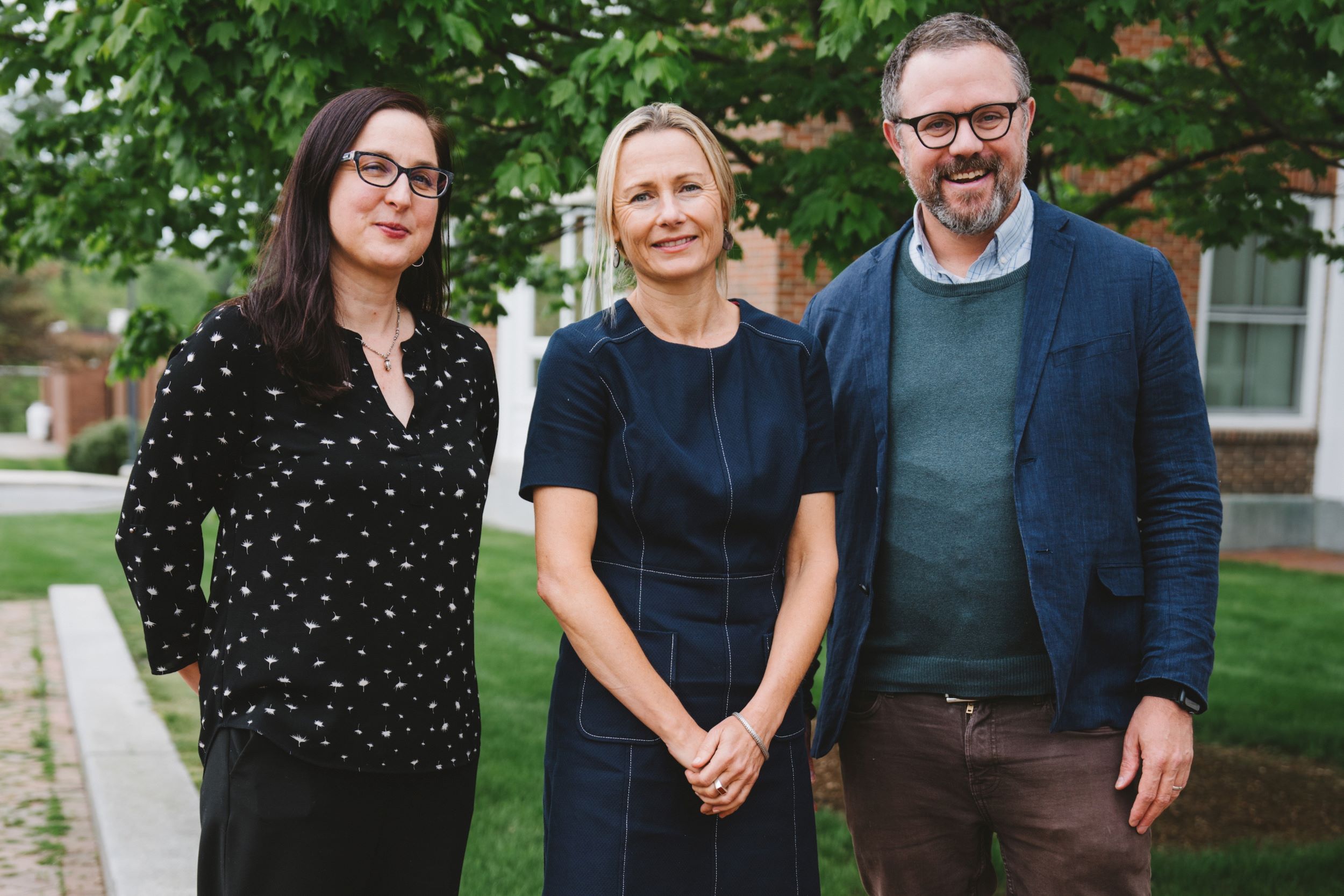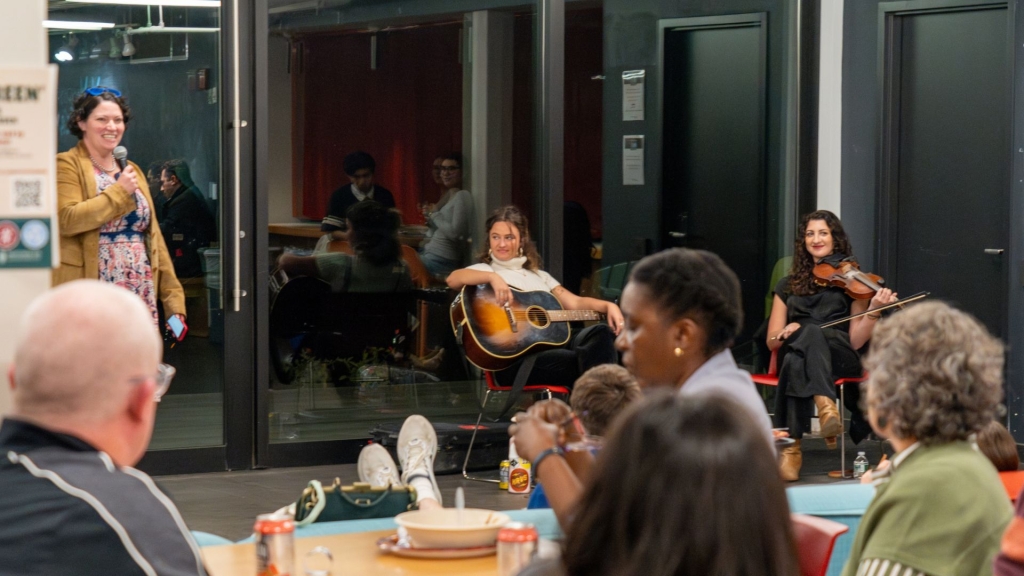When Pamela Duffy joined West House as an administrative assistant nearly 10 years ago, she never imagined just how meaningful—and multifaceted—her new role would be.
“I get to see so much growth,” says Duffy, whose position evolved into program coordinator for the West House community. “One of my greatest joys is to see students arrive as teenagers just out of high school and leave as adults, making lifelong friends along the way. So many students stay in touch with me. It’s a deeply fulfilling role.”
From working with affiliated faculty to plan one-of-a-kind events to doling out BandAids and chicken noodle soup, to leading overnight trips with students to New York City, Duffy relishes the nurturing role she plays in students’ lives.
“A great number of international students call me ‘auntie,’” she says with a smile. “I find that the more that we are generous with ourselves, the more likely students are to open up.”
As Dartmouth’s house system approaches its 10-year anniversary in 2026, the residential program is poised to expand its reach to even more students, faculty, and staff across campus.
“The growth of the house communities over the past 10 years has just been phenomenal,” says Duffy.
Last summer, after eight years as the inaugural house professor of West House, Ryan Hickox stepped into the role of director of house community development. In this new leadership position, he collaborates closely with house faculty and residential life staff to enhance community and envision the house system as a key part of a new school of Arts and Sciences.
“It’s so important to know that you’re part of a community with other people, and that there’s a familiar place you can return to the whole time you’re at Dartmouth—and even past graduation,” Hickox says. “And it’s not just undergrads—it’s also faculty, staff, and graduate students. I think that’s incredibly powerful.”
“Close collaboration between staff and faculty powers Dartmouth’s house system,” says Nina Pavcnik, interim dean of Arts and Sciences. “As we move towards a school of Arts and Sciences, I look forward to seeing the house communities play an even bigger role in infusing Dartmouth with meaningful and creative opportunities to build connections across campus.”

House professors Janice McCabe and Sienna Craig with Ryan Hickox, who recently took on a new role as director of house community development (Photo by Robert Gill)
Hickox has been involved in the house system from the get-go. As a member of the steering committee for Moving Dartmouth Forward, former president Phil Hanlon ’77’s plan to address high-risk behavior on campus and create a safe and inclusive environment for students, he helped develop and launch the six house communities in 2016.
All undergraduates are assigned to one of six houses when they arrive as first-year students, and they maintain their affiliation throughout their time at Dartmouth. Each house is overseen by a member of the faculty—the house professor—who lives in a single-family home on campus. House leadership teams also include a residential education professional staff member, four resident fellows, a team of undergraduate advisors, and a program coordinator.
Tenure-line faculty and most graduate students are affiliated automatically with individual houses. Graduate students from Tuck and some Geisel programs, as well as all staff, are invited to affiliate.
Over the years, Duffy says that students have taken “a lot of pride” in what house community they come from. She also sees the house communities as particularly helpful for international and first-generation college students.
“A lot of the students who come through my office have never been so far from home,” she says. “Consistency is vital and a great part of their grounding and wellness.”
Hickox’s new position was created and shared last year by long-time house professors Sienna Craig and Janice McCabe.
As Dartmouth creates a new school of Arts and Sciences, the house communities are envisioned as “the home and model of ideal integration” between the Faculty of Arts and Sciences and Student Affairs division, says McCabe, who joined Allen House in 2016. “There's so much potential to create connections to encompass not just undergraduates, but also graduate students and staff across campus.”
“One of the distinguishing elements of Dartmouth's house communities, when compared to peer institutions, is the broader and more inclusive involvement of faculty and staff affiliates,” says Craig, who joined South House in 2019.
In his new role, Hickox has undertaken a variety of collaborative projects, from working with IT staff to improve house communications and database technology to coordinating with Athletics on the intramural program and liaising with Alumni Relations to develop house events during reunion weekend.
Hickox is also working with Stacey Millard, associate dean for residential life, and staff in the Housing Office to implement Dartmouth’s announcement in September that undergraduate students will have more options about where they might live in their junior and senior years. This change, part of the housing vision announced by President Sian Leah Beilock, will give students additional options to live in a residence hall in their house community or in an “all-house” hall, among other choices.

South House students take part in a welcome ceremony this fall at Buddy Teevens Stadium at Memorial Field. (Photo by Robert Gill)
“Another big project I’m involved with is working with the group planning the renovation of the residence halls in the context of the house system,” Hickox says. For example, the 120-year-old Fayerweather residence halls are getting a new, dedicated South House social center. “The dorm renovations are really exciting to me because this is an opportunity to build the house system from the ground up.”
Looking ahead, Hickox says he is also focused on creating a network of house alumni, planning a celebration marking the house system’s 10-year anniversary, and envisioning the next decade of house communities on campus.
Faculty fellows bring unique interests and perspectives
It’s a future that will continue to benefit from robust faculty engagement. Last year, Craig and McCabe launched the House Faculty Fellows program, which invites faculty to collaborate with house leadership teams to expand program offerings geared toward intellectual engagement and fostering faculty-student connections. The second cohort of fellows joined houses this fall.
“It’s been hugely successful and a wonderful addition in terms of engaging faculty more closely and offering programming that relates to their personal and academic interests,” says McCabe. “The ideas and energy faculty bring has been phenomenal.”
For example, government professor Yusaku Horiuchi, a faculty fellow at West House, recently hosted a session on dashi as “the essence of Japanese cuisine.” And Allen House’s Kelly McConnell ’00, Guarini ’03, a senior lecturer of French, worked with Jared Daigrepont ’26 to plan Dartmouth’s first-ever event on Louisiana French language and culture.
“Jared grew up speaking French in Louisiana and approached me to see whether the Department of French and Italian might be interested in putting on some sort of event showcasing Louisiana French and Acadian culture,” she says. “I realized that in my time in the French and Italian Department (13 years teaching, four as an undergrad, and one year as a comparative literature MA student), I’d never seen an event focused specifically on the language and culture of this Francophone region of the United States.”
With support from the French and Italian department, Alexandra Simpson Enrichment Fund for French and Italian, Allen House, and Leslie Center for the Humanities, Daigrepont and McConnell planned two full days of programming that included class visits in French language courses; a public lunch concert in Dartmouth 105; a symposium featuring presentations by guest speakers on Louisiana’s rich cultural and linguistic heritage; and a gumbo dinner and concert by Cajun band Amis du Teche in the Cube that attracted faculty, staff, students, and local guests.
“Making this event happen was really a full community effort,” McConnell says. “It was wonderful to see people dancing, enjoying Louisiana cuisine, and connecting around this dynamic Francophone culture.”
Tenure-line faculty and lecturers with multi-year contracts are invited to apply to serve as a house faculty fellow for the 2025-26 academic year. Fellows collaborate with house teams to deepen faculty-student connections through programs and mentorship. Staff, graduate students at Tuck and Geisel, or others on campus who don’t yet have a house affiliation are also invited to sign up. Over the next year, three new house professors will be recruited to join Allen House, South House, and North Park House.
